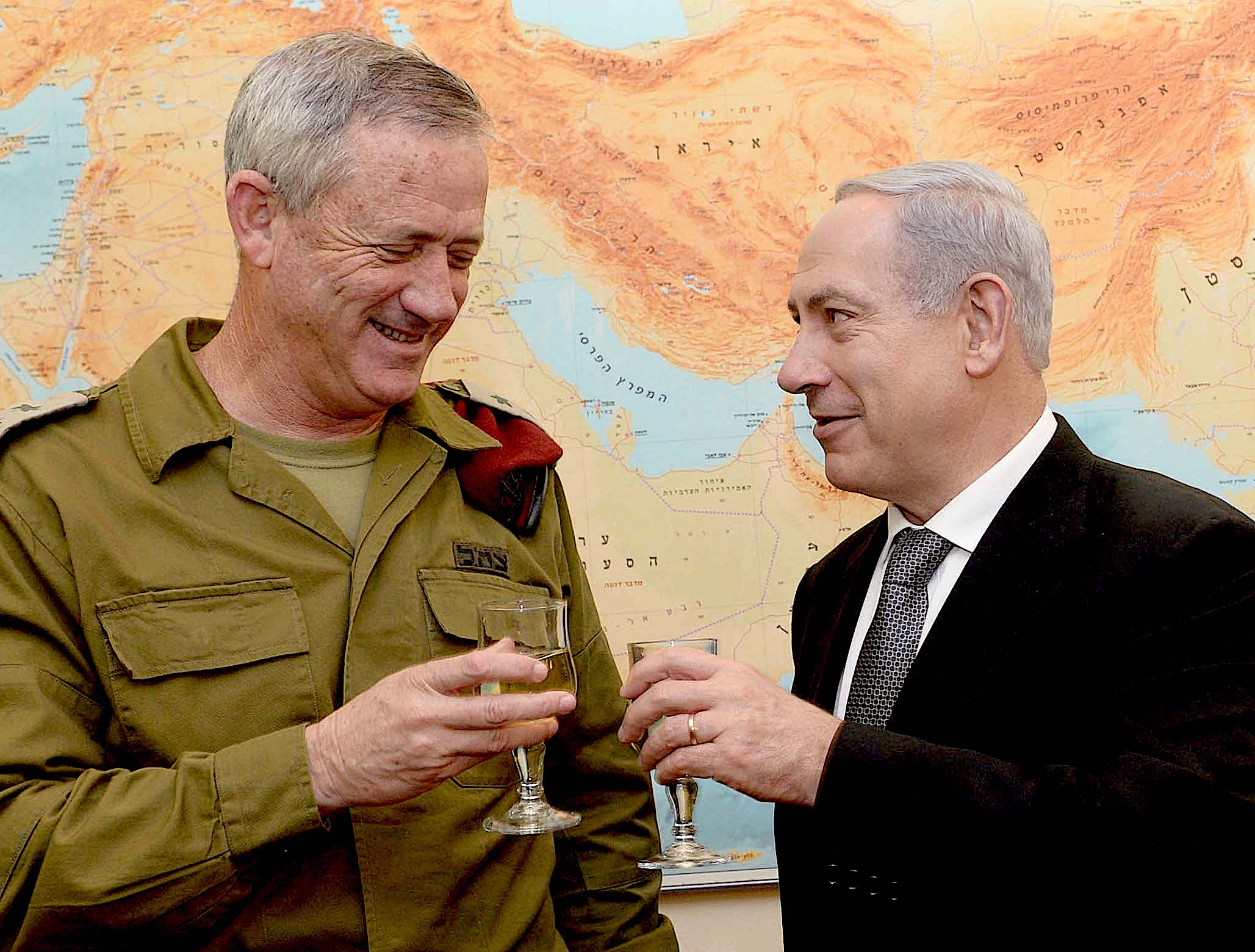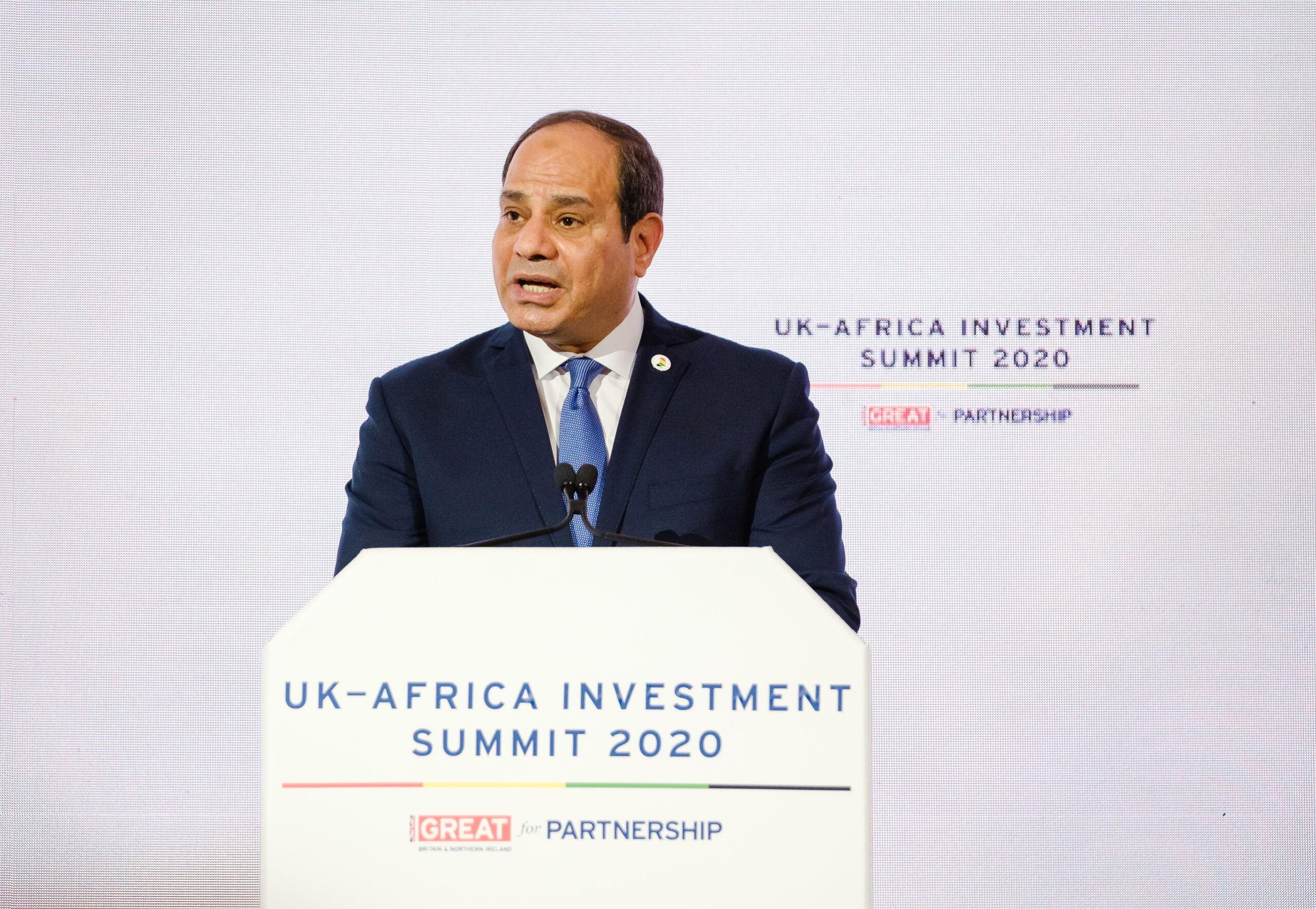May 5, 2024
The U.K. government has repeatedly protected Israeli politicians, spies and soldiers from being arrested for war crimes when they visit Britain, John McEvoy and Phil Miller reveal.

Benny Gantz, then chief of general staff of the IDF, left, and Prime Minister Benjamin Netanyahu meeting in 2013. (Prime Minister of Israel/Flickr)
By James McEvoy and Phil Miller
Declassified UK
The U.K. government has provided special diplomatic immunity to scores of foreign officials accused of committing serious violations of international law, Declassified has found.
Since 2013, the Foreign Office has granted over 50 “special mission” certificates to military and political figures from Israel, Egypt, Saudi Arabia, Qatar, Rwanda and Iran.
Israeli war cabinet member Benny Gantz was granted this protection as recently as March, even after the country was put under investigation for genocide in Gaza.
It comes as the International Criminal Court looks poised to indict two names on Britain’s list: Israel’s prime minister Benjamin Netanyahu and IDF chief of staff Herzi Halevi.
By granting “special mission” immunity, foreign officials have been able to visit the U.K without fear of arrest.
This could breach Britain’s commitment to universal jurisdiction legislation like the Rome Statute, which provides for the most serious crimes to be prosecuted regardless of where they were committed.
The U.K. government argues that the immunity it issues is customary practice under international law. It says these measures are necessary to ensure the smooth conduct of diplomatic relations.
However, the new list indicates that the Foreign Office has deliberately obstructed efforts to prosecute officials from allied states, many of whom have been accused of egregious violations of international law.
The list was obtained by Labour’s former shadow justice secretary, Richard Burgon MP, in response to a question in parliament.
The Pinochet Precedent
In 1998, Augusto Pinochet was arrested in London on a warrant issued by a Spanish judge for crimes against humanity committed during the Chilean dictatorship.
Though Pinochet was ultimately allowed to return to Chile, his arrest served as a “wake-up call to tyrants around the world”.
It showed how, under the principle of universal jurisdiction, state actors could not rely on diplomatic immunity to escape prosecution for serious violations of international law.
Yet over recent decades, it has become increasingly difficult to pursue universal jurisdiction cases in Britain.
In September 2011, David Cameron’s coalition government passed new legislation requiring the consent of the Director of Public Prosecutions (DPP – none other than Keir Starmer) before such arrest warrants could be issued.
The law was implemented with Israeli officials in mind. Britain’s foreign secretary William Hague declared: “We cannot have a position where Israeli politicians feel they cannot visit this country”.
Israel’s former foreign minister Tzipi Livni visited Britain a month later, putting the new legislation to the test.
A human rights group and law firm asked Starmer to approve an arrest warrant for Livni over war crimes allegedly committed during Operation Cast Lead.
That was the bombardment of Gaza in 2008-09 when Israel killed over 300 Palestinian children.
Instead of waiting for Starmer to review the evidence, the Foreign Office attributed “special mission” status to Livni’s visit, granting her temporary diplomatic immunity from arrest.
Following this incident, the Foreign Office established “special mission” immunity as common practice. Livni would rely on it a further three times.
Declassified is reporting on the full list of foreign officials who have been shielded from prosecution under this scheme the first time.
It includes politicians, royalty, generals and spies from some of the world’s most abusive regimes.
Immunity for Israel

David Cameron, then U.K. prime minister, left, with his defence minister Dr. Liam Fox in May, 2010. (UK Ministry of Defence)
The U.K. has granted “special mission” immunity to at least seven Israeli officials who have been accused of serious violations of international law.
Chief amongst them was Israel’s prime minister Benjamin Netanyahu on his visit to Britain in 2015, when he met David Cameron.
It is unclear why Netanyahu required this protection given heads of state and government as well as foreign ministers typically enjoy full diplomatic immunity.
It is possible that immunity was extended to Netanyahu’s entourage, who were not automatically shielded from prosecution.
Other high-profile recipients include Benny Gantz when he was Israel’s army chief of staff between 2011-15.
During this time, he oversaw an airstrike which destroyed a three-storey building in al-Bureij refugee camp. It killed seven members of a Palestinian family inside.
Now part of Israel’s war cabinet, Gantz was once again given temporary immunity when he visited Rishi Sunak and David Cameron in London this March.
General Herzi Halevi, the current head of the IDF who has approved plans for an assault on Rafah, received immunity to visit the U.K. back when he was Israel’s military intelligence chief.
Another name on the list is Amos Yadlin. He ran the IDF’s military intelligence directorate between 2007 and 2010.
Police Feared Gun Battle at Airport
Yadlin played a role in Israel’s raid of the Turkish-owned Mavi Marmara, the lead ship in a flotilla carrying humanitarian aid to Gaza.
Nine of the activists onboard were killed, five with gunshot wounds to the head. Another later died from his injuries.
Doron Almog, a retired Israeli major general, was also granted “special mission” immunity.
As head of the Israeli army’s southern command between 2000-3, Almog was blamed for dropping a one tonne bomb on Gaza City.
It killed 14 civilians, injured 150 people, and destroyed nine apartment buildings. He also authorised the destruction of 59 houses in Rafah refugee camp.
In 2005, an arrest warrant was issued for Almog at Bow Street Magistrates’ Court under the Geneva Conventions Act.
However, he was tipped off by Israeli diplomats upon arriving in London, and refused to leave the plane.
British authorities failed to execute the arrest warrant because “officers feared an attempt to stop him would lead to a gun battle at Heathrow airport”.
Another Israeli official accused of responsibility for dropping that one tonne bomb on Gaza City – Avi Dichter – received immunity for his visit to Britain in 2016.
Israeli military chiefs have been a priority for temporary immunity. It was awarded to Shaul Mofaz when he spoke at the UK parliament in 2015.
Mofaz ran the IDF from 1998 to 2002, a period which spanned the second intifada.
That saw bloody military assaults on Palestinian cities in the illegally occupied West Bank.
Mofaz went on to become Israel’s defence minister “where he was again responsible for numerous human rights violations, including torture, home demolitions and collective punishment”, according to Electronic Intifada.
Other Israelis granted “special mission” status include Yuval Steinitz, when he was international relations minister. He is now chairman of Rafael, Israel’s state-owned arms firm.
Appeasing Egypt

Egypt’s President Abdel Fattah Al-Sisi speaking at a U.K.-Africa investment meeting in London, Jan. 20, 2020. (DFID/Graham Carlow)
Although changes to universal jurisdiction proceedings were made with Israel in mind, other countries have benefited too.
Egyptians are actually the most common nationality on the list.
The Foreign Office issued 35 “special mission” certificates to Egyptians in the regime of General Abdel Fattah al-Sisi. Sisi came to power in 2014 after staging a military coup against Egypt’s first democratically-elected president, Mohamed Morsi, one year prior.
Morsi led the Muslim Brotherhood’s political wing and under his brief tenure Egypt loosened restrictions on Hamas in Gaza, alarming Israel.
Since his overthrow, as Declassified reported, Sisi “has presided over a human rights crackdown in the North African country, locking up thousands of political prisoners. Arbitrary arrest and torture are widespread”.
More than 400 prisoners have been hanged, many of them from the Muslim Brotherhood, in what Human Rights Watch has called an “execution frenzy”.
Amid the repression, the U.K. government has remained a close ally of Sisi’s regime, with diplomatic exchanges continuing, trade booming, and senior MI5 and MI6 officials training Egyptian spies.
In 2015, Egypt’s army chief of staff, Mahmoud Hegazy, travelled to Britain for an arms fair.
Lawyers acting for Morsi’s banned Freedom and Justice party sought Hegazy’s arrest over the torture and massacre of political opponents.
The call for Hegazy’s arrest was supported by 55 British figures including the then shadow chancellor, John McDonnell.
Yet the Foreign Office granted Hegazy “special mission” immunity, shielding him from prosecution. Lawyer Tayab Ali noted:
“When Mr Hegazy came, the only reason the police cited not to act on our request to arrest him was the Foreign Office’s decision to grant him special mission immunity.”
That same year, Sisi’s entourage and advance delegation received temporary immunity, allowing his associates to travel without fear of prosecution.
Other Egyptians awarded immunity were trade minister Mounir Fakhry Abdel Nour, spy chief Khaled Fawzy and military intelligence chief Mohammad Farag Elshahat.
Alex Carlen, human rights coordinator at campaign group FairSquare, commented: “Under Sisi’s rule, Egyptian officials have been credibly accused of perpetrating severe human rights abuses after coming to power following a massacre of more than 800 protestors.
“The UK government has been actively engaged in efforts to sanitise and rehabilitate the image of the Sisi regime. It now transpires that 23 officials have been granted virtual immunity, enabling them to visit the UK without fear of prosecution under our justice system”.
Green Light for Tyrants

Saudi Arabia’s crown prince Mohammed bin Salman was granted special mission status to visit Britain three years into the Kingdom’s war with Yemen. (Palácio do Planalto/Flickr)
Other foreign officials granted “special mission” status to visit Britain include Saudi Arabia’s crown prince, Mohammed bin Salman, Qatar’s attorney general Ali bin Fetais Almarri and Iran’s deputy foreign minister Ebrahim Rahimpour.
Prince Salman’s protection was awarded for his blockbuster visit to the UK in 2018 when he met Queen Elizabeth at Buckingham Palace.
It came months before he ordered the murder of journalist Jamal Khashoggi and three years into the Kingdom’s war with Yemen, which had seen Saudi coalition forces repeatedly bomb hospitals.
Another eye-catching name on the immunity list is Rwandan general James Kabarebe. He was granted “special mission” status to visit Britain in 2016 when he was president Paul Kagame’s defence minister.
The reason for Kabarebe’s visit was apparently to speak at a U.N. peacekeeping conference in London alongside defence ministers from all over the world.
Four years prior, a leaked U.N. report had identified Kabarebe “as effectively directing a Congolese rebel militia accused of killings, rapes and other atrocities”.
This militia, named M23, was said to be coordinated by Rwandan officials who were attempting to plunder Congo’s mineral resources.
Kabarebe is also accused of involvement in the shooting down of Rwandan president Juvenal Habyarimana’s plane, whose death sparked the genocide in 1994.
He was ordered to comply with a French investigation into the matter in 2017, but refused. Campaign group Redress previously noted that:
“The U.K. should refuse to accept an individual as being on a special mission, and potentially entitled to immunity, when there are reasonable grounds to suspect that the individual has been involved in or associated with international crimes including torture, war crimes, crimes against humanity or genocide”.
This story was first published by Declassified UK.
Phil Miller is Declassified UK’s chief reporter. He is the author of Keenie Meenie: The British Mercenaries Who Got Away With War Crimes. Follow him on Twitter at @pmillerinfo.
John McEvoy is an independent journalist who has written for International History Review, The Canary, Tribune Magazine, Jacobin and Brasil Wire.
No comments:
Post a Comment